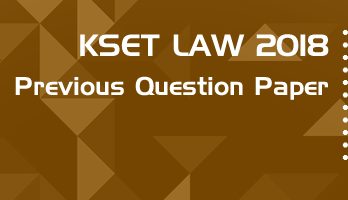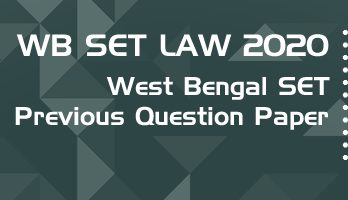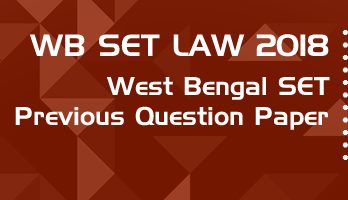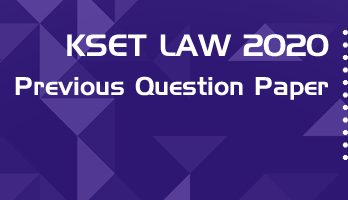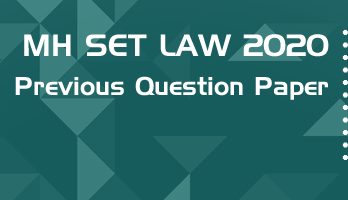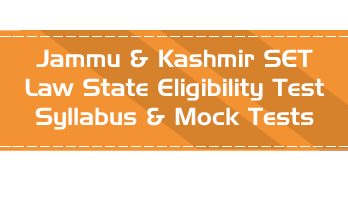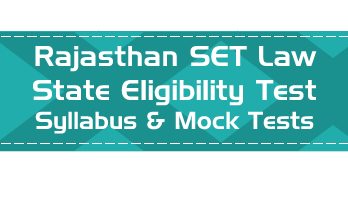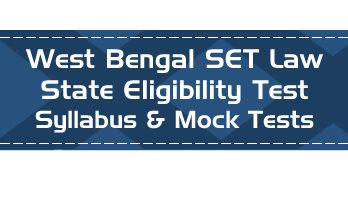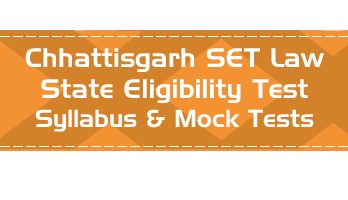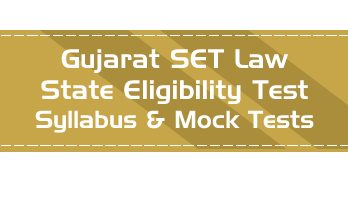- Based on latest Karnataka State Eligibility Test Law Paper II Syllabus
- Law Subjects Overview Material covering important topics and concepts - 650 page PDF Book
- 50 Full Length Mock Tests - New Pattern Paper II, with 100 questions each
- 50 Mini Practice Mock tests - with 25 questions each
- Unlimited Practice - New Questions in every mock test with every attempt
- Answer choices of all questions shuffled randomly for better practice
- Database of over 9500 MCQs covering the entire syllabus
- Includes new comprehension based questions
- Questions & Answer Choices randomly shuffled in every attempt for better practice
- Accessible 24 x 7 via Smart-Phone browsers and Desktops
"Just wanted to let you know that I have cleared JRF with 99.99th percentile. Thank you for all your help and support that made it possible. " - Kanchan Yadav
"Thank you so much for the UGC NET test series. I finally qualified the exam. It was possible because of the mock test series provided by your team." - Robin Jaiswal
Origin of the KSET – Karnataka State Eligibility Test
After the UGC NET exam was instituted, it was felt that the eligibility test at the national level may not be completely able to represent the subjects which are regional in their character.
There was also a significant demand for enabling candidates to appear for the Test in their state’s official language. The State Governments were therefore, given the option of conducting their own State Level Test for eligibility for Lectureship at the state level. Thus the concept of KSET, i.e., Karnataka State Eligibility Test for Lectureship Eligibility in the state of Karnataka was designed.
The KSET Karnataka State Eligibility Test is conducted annually, for several popular subjects.
Strictly adhering to the guidelines stipulated by the UGC-NET Bureau, KSET center, will be conducting the State Eligibility Test once in a year to make rigorous merit based selection for the entry level of teaching profession. Currently KSET is conducting test in 39 subjects at eleven (11) Nodal Centers spread across the Karnataka State.
Main differences – KSET 2025 & 2026 Law and UGC NET Law
Candidates clearing the KSET in Law subject are eligible to apply for posts of Assistant Professor within Karnataka, where as UGC NET Law cleared candidates can apply across all states of India.
The KSET – Karnataka State Eligibility Test is conducted for Assistant Professor Eligibility only, there is no JRF – Research Fellowship qualification through the KSET.
While the UGC NET Law is conducted once in every six months, the KSET – Karnataka State Eligibility Test is conducted annually.
Eligibility Criteria and age limit for KSET Law 2025 & 2026
Candidates who have passed Master’s degree with a minimum of 55% of marks are eligible for KSET. However, the minimum eligibility marks required for reserved category and PH candidates of Karnataka is 50% in the Master’s degree. All the reservation policies pertaining to KSET are applicable to Karnataka candidates only. Reserved category candidates from other states appearing for KSET shall be treated under General Category only.
Candidates who are pursuing their final-year Master’s degree course are also eligible to appear in the KSET. The candidates must pass their Master’s degree with a minimum of 55% (50% for reserved category candidates) within the prescribed cut off date, to be eligible for the KSET certificate.
Candidates are required to appear for the KSET in the subject that is relevant to his / her qualification at the Master’s level. Candidates who do not find relevant subject can appear for UGC NET or CSIR NET exams, which are conducted twice a year.
Candidates who have completed PGD (Post Graduate Diploma) courses may also be eligible for KSET. However, the candidate should ascertain and get the required equivalence certification from the Association of Indian Universities (AIU) – New Delhi; with the certificate stating that the candidate’s PGD has been deemed to be equivalent to a Master’s Level Degree.
There is no upper age limit for the KSET 2025 & 2026.
The Eligibility for Assistant Professor only will depend on the performance of the candidate in both the papers of KSET in aggregate. The candidates who qualify the Karnataka State Eligibility Test for eligibility for Assistant Professor will be governed by the rules and regulations for recruitment of Assistant Professor of the concerned Universities / Colleges / State Government of Karnataka, as the case may be.
Exam Pattern for KSET 2025 & 2026 – Karnataka State Eligibility Test Law Subject
KSET 2025 & 2026 Examination will consist of two papers. Both the papers will consist of only objective type questions and will be held as under:
- Paper I – 100 marks – 50 questions (2 Marks per question) – All questions are compulsory
- Paper II (Law) – 200 marks – 100 questions (2 Marks per question) – All questions are compulsory
Total time allocated for both the question papers in KSET is 3 Hours (180 minutes) in one session. There will be no break between the papers.
In KSET Paper- I, the questions which will be of general nature, intended to assess the teaching / research aptitude of the candidate. It will primarily be designed to test reasoning ability, comprehension, divergent thinking and general awareness of the candidate.
In KSET Paper-II, questions will be based on Law subjects and topics. This paper is intended to test the subject matter expertise of the candidate in his / her area of specialization.
Procedure and Criteria for Declaration of KSET Result
Step I:
The number of candidates to be qualified (total slots) for Eligibility for Assistant Professor shall be equal to 6% of the candidates appeared in both the papers of KSET.
Step II:
The total slots shall be allocated to different categories as per the reservation policy of Government of Karnataka.
Step III:
In order to be considered eligible for Assistant Professor, the candidate must have appeared in both the papers and secured at least 40% aggregate marks in both the papers taken together for General (Unreserved) category candidates and at least 35% aggregate marks in both the papers taken together for all candidates belonging to the reserved categories viz., SC, ST, SEBC (belonging to Non-Creamy Layer), PWD (PH/VH) and Transgender.
Hall Ticket or Admit Card for KSET – Karnataka State Eligibility Test Law Subject
The hall ticket or admit card will be uploaded on the website official KSET website and candidates should download the same and carry a hard-copy print to the exam venue. No hall ticket will be sent to the candidates by post.
The hall ticket or admit card will contain the final exam venue and timing details for the Karnataka State Eligibility Test Law exam.
No candidate will be allowed to appear at any examination center other than the one specifically allotted to him/her in the Hall Ticket or Admit Card.
Official Detailed Syllabus for KSET 2025 & 2026 – Karnataka State Eligibility Test – Law Subject
UNIT – I: JURISPRUDENCE
1. Nature and sources of law
2. Schools of jurisprudence
3. Law and morality
4. Concept of rights and duties
5. Legal personality
6. Concepts of property, ownership and possession
7. Concept of liability
8. Law, poverty and development
9. Global justice
10. Modernism and post-modernism
UNIT – II: CONSTITUTIONAL AND ADMINISTRATIVE LAW
1. Preamble, fundamental rights and duties, directive principles of state policy.
2. Union and State executive and their interrelationship
3. Union and State legislature and distribution of legislative powers
4. Judiciary
5. Emergency provisions
6. Temporary, transitional and special provisions in respect of certain states
7. Election Commission of India
8. Nature, scope and importance of administrative law
9. Principle of natural justice
10. Judicial review of administrative actions – Grounds.
UNIT – III: PUBLIC INTERNATIONAL LAW AND INTERNATIONAL HUMANITARIAN LAW
1. International law – Definition, nature and basis
2. Sources of International law
3. Recognition of states and governments
4. Nationality, immigrants, refugees and internally displaced persons (IDPs)
5. Extradition and asylum
6. United Nations and its organs
7. Settlement of international disputes
8. World Trade Organization (WTO)
9. International humanitarian law (IHL) – Conventions and protocols
10. Implementation of IHL – Challenges
UNIT – IV: LAW OF CRIMES
1. General principles of criminal liability – Actus reus and mens rea, individual and group liability and constructive liability
2. Stages of crime and inchoate crimes – Abetment, criminal conspiracy and attempt
3. General exceptions
4. Offences against human body
5. Offences against state and terrorism
6. Offences against property
7. Offences against women and children
8. Drug trafficking and counterfeiting
9. Offences against public tranquility
10. Theories and kinds of punishments, compensation to the victims of crime
UNIT – V: LAW OF TORTS AND CONSUMER PROTECTION
1. Nature and definition of tort
2. General principles of tortious liability
3. General defenses
4. Specific torts – Negligence, nuisance, trespass and defamation
5. Remoteness of damages
6. Strict and absolute liability
7. Tortious liability of the State
8. The Consumer Protection Act 1986 – Definitions, consumer rights and redressal mechanism
9. The Motor Vehicles Act, 1988 – No fault liability, third party insurance and claims tribunal
10. The Competition Act, 2002 – Prohibition of certain agreements, abuse of dominant position and regulation of combinations
UNIT – VI: COMMERCIAL LAW
1. Essential elements of contract and e-contract
2. Breach of contract, frustration of contract, void and voidable agreements
3. Standard form of contract and quasi-contract
4. Specific contracts – Bailment, pledge, indemnity, guarantee and agency
5. Sale of Goods Act, 1930
6. Partnership and limited liability partnership
7. Negotiable Instruments Act, 1881
8. Company law – Incorporation of a company, prospectus, shares and debentures
9. Company law – Directors and meetings
10. Corporate social responsibility
UNIT-VII: FAMILY LAW
1. Sources and schools
2. Marriage and dissolution of marriage
3. Matrimonial remedies – Divorce and theories of divorce
4. Changing dimensions of institution of marriage – Live-in relationship
5. Recognition of foreign decrees in India on marriage and divorce
6. Maintenance, dower and stridhan
7. Adoption, guardianship and acknowledgement
8. Succession and inheritance
9. Will, gift and wakf
10. Uniform Civil Code
UNIT –VIII: ENVIRONMENT AND HUMAN RIGHTS LAW
1. Meaning and concept of ‘environment’ and ‘environmental pollution’
2. International environmental law and UN Conferences
3. Constitutional and legal framework for protection of environment in India
4. Environmental Impact Assessment and control of hazardous waste in India
5. National Green Tribunal
6. Concept and development of human rights
7. Universalism and cultural relativism
8. International Bill of Rights
9. Group rights – Women, children, persons with disabilities, elderly persons, minorities and weaker sections
10. Protection and enforcement of human rights in India – National Human Rights Commission, National Commission for Minorities, National Commission for Women, National Commission for Scheduled Castes, National Commission for Schedule Tribes and National Commission for Backward Classes
UNIT – IX: INTELLECTUAL PROPERTY RIGHTS AND INFORMATION TECHNOLOGY LAW
1. Concept and meaning of intellectual property
2. Theories of intellectual property
3. International conventions pertaining to intellectual properties
4. Copyright and neighboring rights – Subject matters, limitations and exceptions, infringement and remedies
5. Law of patent – Patentability, procedure for grant of patent, limitations and exceptions, infringement and remedies
6. Law of trademark – Registration of trademarks, kinds of trademarks, infringement and passing off, remedies
7. Protection of Geographical Indications
8. Bio-diversity and Traditional Knowledge
9. Information technology law- digital signature and electronic signature, electronic governance, electronic records and duties of subscribers
10. Cyber crimes, penalties and adjudication
UNIT – X: COMPARATIVE PUBLIC LAW AND SYSTEMS OF GOVERNANCE
1. Comparative Law – Relevance, methodology, problems and concerns in Comparison
2. Forms of governments – Presidential and parliamentary, unitary and federal
3. Models of federalism – USA, Canada and India
4. Rule of Law – ‘Formal’ and ‘substantive’ versions
5. Separation of powers – India, UK, USA and France
6. Independence of judiciary, judicial activism and accountability – India, UK and USA
7. Systems of constitutional review – India, USA, Switzerland and France
8. Amendment of the Constitution – India, USA and South Africa
9. Ombudsman –Sweden, UK and India
10. Open Government and Right to Information – USA, UK and India
The syllabus for KSET is predominantly based on the standard LLB syllabus + there are additional areas that are covered in common across LLM courses.
- Based on latest Karnataka State Eligibility Test Law Paper II Syllabus
- Law Subjects Overview Material covering important topics and concepts - 650 page PDF Book
- 50 Full Length Mock Tests - New Pattern Paper II, with 100 questions each
- 50 Mini Practice Mock tests - with 25 questions each
- Unlimited Practice - New Questions in every mock test with every attempt
- Answer choices of all questions shuffled randomly for better practice
- Database of over 9500 MCQs covering the entire syllabus
- Includes new comprehension based questions
- Questions & Answer Choices randomly shuffled in every attempt for better practice
- Accessible 24 x 7 via Smart-Phone browsers and Desktops
"Just wanted to let you know that I have cleared JRF with 99.99th percentile. Thank you for all your help and support that made it possible. " - Kanchan Yadav
"Thank you so much for the UGC NET test series. I finally qualified the exam. It was possible because of the mock test series provided by your team." - Robin Jaiswal


